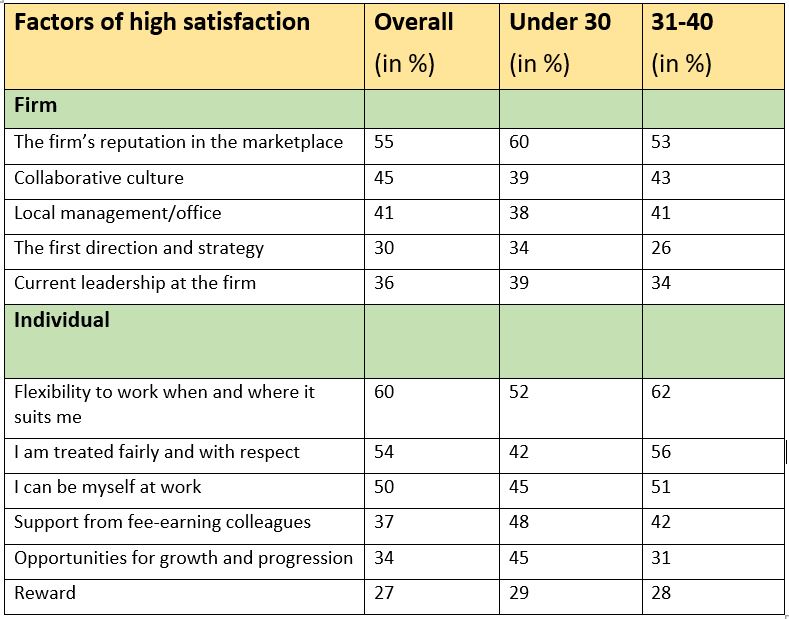The threat of an ongoing war for top legal talent and the hangover of the pandemic-inspired realignment of working priorities continues to loom large for many law firms in Canada
To assist in retention, the Thomson Reuters Institute conducted a pulse survey in February of associate feedback on these employees’ decisions to stay or leave their current employer. Their responses provide a few easy-to-implement recommended actions for law firms that wish to retain key employees and stem the tide of wider attrition.
Factors leading associates to leave their firms
The research found that 64% of associates at law firms in Canada indicated that they are likely or somewhat likely to move firms. Some 39% of respondents were associates under the age of 30; and 34% were between ages 31 and 40. This indicates that law firms have some work to do to retain younger lawyers (those under 40 years of age).
Further, when it came to identifying which factors drove employees to consider leaving their current firm, associates named these five factors, in order of importance:
-
-
-
- latest compensation amount
- lack of career progression
- overall compensation system
- feeling under appreciated
- lack of genuine regard for employee’s well-being
-
-
What is interesting is that three of these five factors — the lack of career progression, feeling underappreciated, and lack of regard for well-being — are all pretty easy to address. Managers, supervisors of work, and those delivering associates’ performance reviews all have the best opportunity to fix these areas by simply saying Thank you more often. This simple step will help increase associates’ feeling of being appreciated.
In addition, sitting down with each lawyer, either monthly or quarterly, and asking the following questions will help Canadian law firms address the feedback associates are giving on the lack of career progression and a lack of regard for their well-being.
-
-
-
- What are your goals?
- What areas of the firm are you interesting in exploring?
- What can we do to help you build a career here at the firm?
- How are you doing? What support do you need?
-
-
Drivers of stay decisions at law firms
The research also offered insights on the key factors that kept associates at their current Canadian law firms, thereby increasing firm retention. These factors include:
-
-
-
- higher compensation, which was cited by 44% of respondents
- increasing hires to reduce individual workload (26%)
- reducing billable hour targets (24%)
- offering alternatives career paths to partnership (21%)
- demonstrating the importance of employee well-being (21%)
-
-
The bottom two factors also are relatively easy to address without impacting the economics of the firm significantly. By expanding career paths and signaling increased priority on associates’ well-being, law firm leaders can improve the likelihood that the firm will retain its associates under 40.
Colleagues and type of work seen as key “stay” factors
What younger Canadian lawyers liked most about their firms, according to the research, was the people with whom they worked, the quality and type of work they’re given, and the culture of the work environment. These areas align pretty well with the data which shows that associates under 40 have the highest levels of job satisfaction among their peers.
Overall, the majority of associates under 40 at Canadian law firms were highly satisfied with the firm’s reputation in the marketplace; but, unfortunately, there was a huge drop-off in associate satisfaction when it came to the firm’s direction and strategy, local management, and current leadership.

When it came to the individual factors, flexibility in terms of where and when works gets done had the highest percentage of associate satisfaction. However, there were some notable distinctions between those associates under 30 years of age, and associates between 31 and 40.
For example, the research shows that law firms in Canada clearly have work to do in terms of offering satisfying career progression options for associates between the ages of 31-40, as there was a 14-percentage-point differential between associates under 30 (at 45%), and those aged 31-40 (at 31%) saying they were satisfied with their career progression.
For the under-30 population, law firms also need to do a better job at demonstrating respect and fairness with a 14-percentage-point differential between those associates under-30 (at 42%) and associates in the 31-40 age range (at 56%) saying they felt treated with respect and fairness.
Recommendations for action
Taking in all of the data, Canadian law firms should see the opportunity they have to double-down on what associates appreciate most about the firm and to seek to alleviate the gaps in areas where there is less than ideal satisfaction. Here are some suggestions:
Reputation & culture — Firms should continue to emphasize their reputation in the marketplace and their culture of flexibility. These are the two strongest firm and individual factors that under-40 lawyers said they appreciate about their current firm.
Incentivize quality feedback — Reward efforts by managers, supervisors of work, and those delivering performance evaluations who sit down individually with associates on a regular basis to better understand each associate’s goals, ask what support is needed, and what actions the firm can take to help the lawyer build a satisfying career at the firm.
Open up career paths — Work on expanding options for career paths beyond the simple path to partnership by explaining and emphasizing the path to Of Counsel or reduced hours or part time work. Firms can also support associates who may want to explore other interests or start another business outside of the legal industry. For example, if an associate expresses the desire to work in-house, the firm could help the associate find a job with a client, benefiting all parties.
These investments of time and energy will help Canadian law firms boost their retention of younger lawyers and reduce the costs of attrition. Indeed, at the current rate of six figures per associate, multiplied by the current rates of attrition experienced by many law firms in Canada, the cost of clarifying career paths, treating people with respect, or offering a simple Thank you or Well done seems pretty miniscule by comparison.







